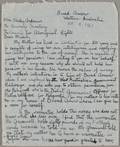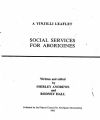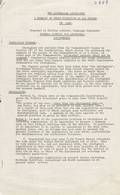Campaigning for Social Service benefits
The evidence of high handedness when it came to pensions, which Mary Bennett provided to Shirley Andrews, led to campaigns both to change laws and to change practices.
One of Mary Bennett's last acts in her long life of assisting Aboriginal Australians to gain some justice, was a letter she wrote on behalf of an Aboriginal pensioner who was going to live with her son in Kalgoorlie. Although the pensioner was used to managing her own money, she was required to go to a warrantee who held her pension for her.
Letter to help a pensioner control her own money
Box 4, Council for Aboriginal Rights (Vic.) Papers, State Library of Victoria
More info on Letter to help a pensioner control her own money
An ongoing cause of dissatisfaction was that even when Aboriginal people were found to be eligible for pensions, they had to apply to the local police officer or magistrate in order to gain access to any of their entitlements. Shirley Andrews never forgot the story of a young Cairns woman's experience:
I was very affronted to hear the story about this lass. She was a late teenager, she had gone and asked the policemen to buy, she wanted to buy another petticoat, and he said she had one; that was enough. And you know, I was really shocked at that and it was her own money, and what did he think she was going to do when it was in the wash?
Such situations were common at this time, and for people who had not received an education the assistance of individuals or organisations was necessary if applicants were to have any chance of actually receiving their pensions.
Campaigns in the 1950s by the Victorian Council for Aboriginal Rights, and later by the Federal Council for Aboriginal Advancement, led to amendments of the Social Services Act 1959, but racial limitations remained. While the new Act repealed the earlier restrictions, it added clause 137a which stated:
An aboriginal native of Australia who follows a mode of life that is, in the opinion of the Director-General, nomadic or primitive, is not entitled to a pension, allowance, endowment or benefit, under this Act.
The terms 'nomadic' and 'primitive' were not defined. But Shirley Andrews was quick to point out to the minister that a nomadic, or itinerant, lifestyle did not stop other Australians from being eligible for social service benefits. Andrews saw this clause with its undefined terms as a further example of paternalism, which was open to abuse.
In questioning the government's motives for such an exclusion, Shirley Andrews pointed out that people still living a traditional nomadic life would hardly be applying for benefits.
With the passage of the amended Act the campaigning focus took two directions. The first direction was provision of information to Aboriginal people about how to apply for an old age pension or any of the other benefits for which they were now eligible.
In 1963 Shirley Andrews and Rodney Hall (who would later become well known as a novelist) published A Yinjilli Leaflet: Social Services for Aborigines. This leaflet did what the government failed to do; it told Aboriginal and Torres Strait Islander readers what benefits they could apply for and how and where to do this. The leaflet told Aboriginal readers:
You have the same rights as other Australians to claim social service benefits.
Yinjilli Leaflet: Social Services for Aborigines, Shirley Andrews and Rodney Hall, 1963
Council for Aboriginal Rights, MS 12913, State Library of Victoria
More info on Yinjilli Leaflet: Social Services for Aborigines, Shirley Andrews and Rodney Hall, 1963
The Federal Council distributed this leaflet to missions, reserves and cattle stations across the continent. The fact that many of the people it was addressed to were illiterate, however, meant that mission and reserve managers could control whether the information was passed on.
The second direction was to alert the Australian public as a whole to the fact that most Aboriginal pensioners did not receive the benefits to which they were entitled. Instead their benefits were paid to the missions or reserves where these pensioners lived.
Unlike A Yinjilli Leaflet written for Aboriginal readers, 'Social Service benefits still denied to Aborigines' addressed non-Aboriginal Australians. Shirley Andrews pointed out that changing the law was not enough. People who were eligible for a pension but were living on a mission or government reserve were not paid directly. Instead the money went to the institution. This system was open to abuse and mismanagement.
'Social Service benefits still denied' by Shirley Andrews
Smoke Signals, March 1961
More info on 'Social Service benefits still denied' by Shirley Andrews
A further valuable contribution which Shirley Andrews made to public knowledge was a tabulation, The Australian Aborigines: A Summary of their Situation in all States in 1962. This showed the plethora of state laws governing people, variously defined by state governments as 'Aborigines' and the limitations to their rights - to move, to marry, to rear their children, to handle their earnings or to own property. This table was circulated to interested bodies and provided the clear evidence of legislation which robbed people of basic rights. For example, in Queensland at this time mission dwellers' letters could be legally opened before being passed to the recipient. This document was most likely the first attempt to make publicly available much needed information at a time when the numbers of vocal critics of government failures in Aboriginal affairs was growing. It also strengthened the argument for encouraging the Commonwealth to take a more active role.
'The Australian Aborigines: a summary of their situation in all states in 1962'
Box 3/4, Council for Aboriginal Rights (Vic.), Papers, MS 12913, State Library of Victoria
More info on 'The Australian Aborigines: a summary of their situation in all states in 1962'
Related resources
People
Shirley Andrews
Mary Bennett
Rodney Hall
Organisations
Victorian Council for Aboriginal Rights
Federal Council for Aboriginal Advancement
383574
- 383513
- 383527
- 383551
- 383574
- 383593



